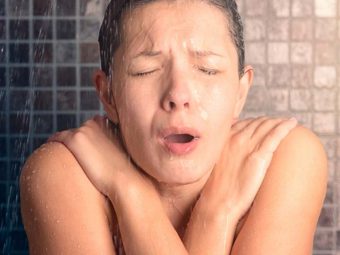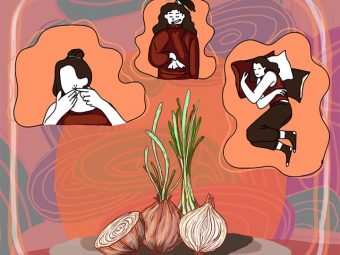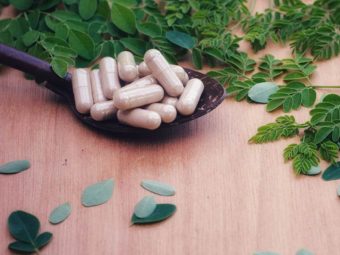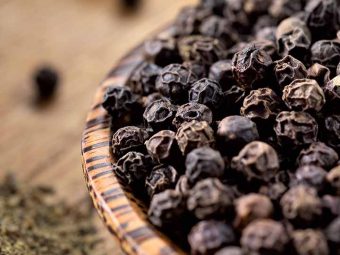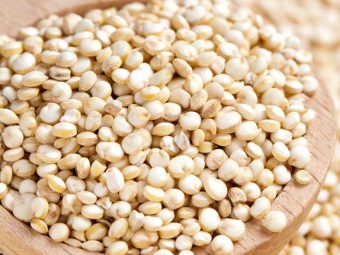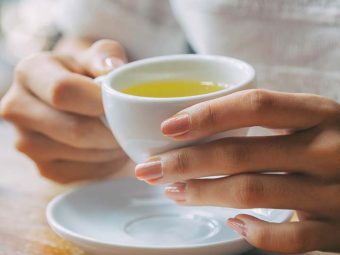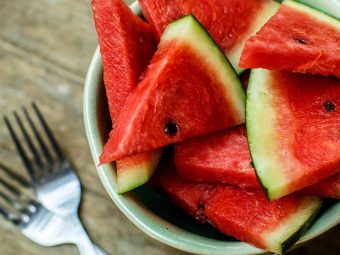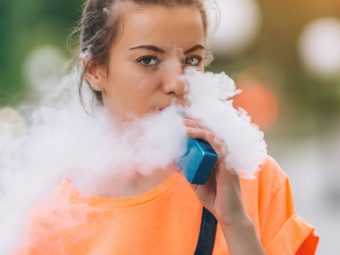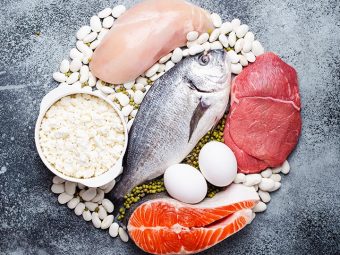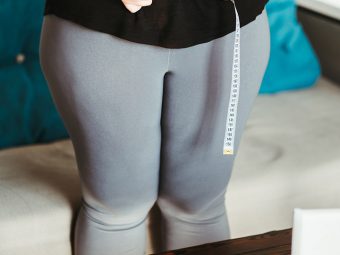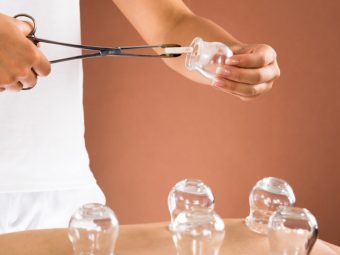7 Surprising Cold Shower Benefits & How To Take One
Learn the perks of cold showers to unlock their surprising benefits and elevate your daily routine.
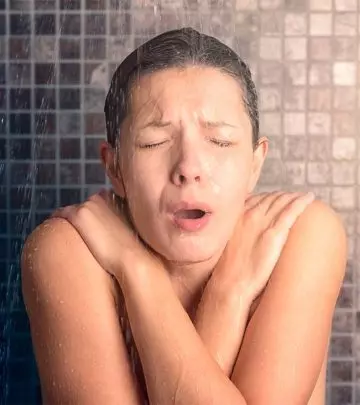
Image: Shutterstock
For many of us, a warm water shower after a hectic day relieves stress and helps us relax. But do you know cold shower benefits outweigh this short-term relief? Cold showers are not preferred as many of us do not want to shiver while taking the morning bath. However, taking a cold shower can relieve pain, boost the body, and improve overall health. Want to know how exactly it works and how it can offer an array of benefits? Continue reading the article to get an answer to these queries.
In This Article
What Is Cold Hydrotherapy?
Cold hydrotherapy is the practice of using cold water for pain relief and to treat various health issues. It is a part of alternative medicine, widely used in Indian, Egyptian, and Chinese cultures(1).
In temperature-based hydrotherapy, cold or hot water stimulates blood flow to the skin and underlying tissues by constricting or dilating the blood vessels. Hydrotherapy has several benefits, including detoxification (helps to expel waste), relaxation, enhanced metabolic rate, and digestion, and hydration.
Additionally, it stimulates blood supply to the immune system and internal organs for better functioning. Overall, hydrotherapy can become a significant tool for stress relief and improving body function (1).
 Did You Know?
Did You Know?In a survey conducted among 6174 adults about their preference for bath and showers, it was found that 75% of them voted for showers, 12% of them voted for baths, and 9% of them voted that they used both equally. So quick cold showers are preferred by the majority.
The blogger details his journey of how he remained motivated to take a cold shower for 100 consecutive days. He wrote about his experience after the first cold shower, “After about 5 minutes, I got out, and felt great. I felt awake, I felt energized, and I felt proud of myself for getting through the pain and misery of my first cold shower. I decided right then and there that I liked it, and I wanted more (i).”
Taking cold showers is not a new concept and may have several health benefits.
Benefits Of Cold Showers
1. May Prevent Moisture Loss
Changes in water temperature affect the skin’s sebum production (2). Hot or warm water can strip the natural oils, leaving your skin dry. On the other hand, a cold shower prevents transepidermal water loss to maintain skin hydration levels. It also prevents scalp dryness and may help maintain healthy hair. Moreover, reduced skin hydration increases the risk of developing wrinkles and fine lines (3), (4).
2. May Improve Your Mood
Cold hydrotherapy may have an anti-depressive effect. Clinical trials show that a cold shower may send electrical impulses to the brain through the cold receptors in the skin and activate the sympathetic nervous system. This may relieve depressive symptoms. However, more rigorous research is required to validate this hypothesis (5).
3. May Boost Post-Exercise Recovery
Intense exercise often causes microtrauma and muscle tears. Experts believe that an ice bath or a cold shower constricts blood vessels and flushes waste products from the affected tissues. It reduces swelling, soreness, muscle pain, and further tissue breakdown (6 ). However, further large-scale studies are required to prove the efficacy of this routine.
3. May Warm Up Your Body
Yes! A cold shower during the winters can help you stay warm! It is because cold exposure activates the brown adipose tissue (BAT) present in your body. This tissue helps maintain body temperature in cold conditions to keep you warm. The moment you take a cold shower, your body shivers and sends nerve impulses to the brain. As a result, the muscles contract, and the BAT is activated (7).
4. May Prevent Common Health Issues
A survey involving 3018 healthy adults found that persons who took regular (hot-to-) cold showers reported a 29% reduction in self-reported sickness during a 30-day follow-up. The participants also reported an increase in perceived energy levels (like the effect of caffeine) (8).
5. May Increase Alertness
Taking a cold shower may increase alertness in humans. Cold water can increase heart rate, blood pressure, and respiratory rate (9). All these physiological changes may awaken your senses and make you alert and energetic.
6. May Increase Metabolism
Cold showers may boost metabolism by activating brown fat that generates heat to keep the body warm. When exposed to cold water, the body works harder to maintain its core temperature, which leads to increased calorie burning to produce more heat. In addition, the shock of cold water can stimulate the nervous system.
7. May Lower Cortisol Levels
Taking a cold shower is often associated with lower levels of cortisol, the stress hormone. When your body is exposed to cold water, the nervous system triggers a stress response. This prompts the body to adapt by reducing cortisol production and as a result, contributing to stress relief and improving your mood.
The pathway of how cold shower works is unclear yet. So, more empirical evidence is required to prove all the benefits we discussed. Moreover, the studies mostly took place in a controlled setting. However, experts believe that a cold shower at home can have similar effects. Here is how you can take a cold bath and reap all its benefits.
How To Take A Cold Shower
- Use Warm And Cold Water Alternately: Shower with cold water (or room temperature water) for a minute, and then shower with warm water. Keep alternating the temperature. This is beneficial for those who are not used to cold baths.
- Hot-To-Cold Shower: Shower with warm water as you regularly do. However, end your shower with a cold bath for 60-90 seconds.
- Cold Immersion: Immerse your body in a pool of cold water (≤15˚C). This is beneficial immediately after exercising. However, do not take a cold dip if you are not used to it. Consult a sports therapist before trying cold immersion.
NASM Certified Personal Trainer Rachel Rivera recommends, “Take time to work your way up to 10 minutes of a cold shower. Hum or sing to control your nervous system and stimulate the vagus nerve.”
 Did You Know?
Did You Know?As an extra measure, she adds, “After showering, if possible, stay naked for a bit to avoid the clothes warming you up. This will force your body to use brown fat, aka adipose tissue, to warm you up, which will aid in weight loss!”
Rivera further emphasizes the importance of taking a cold shower during the day. She says, “You can take a cold shower every day, there’s no harm in that! I do recommend taking the earlier in the day rather than later, as it may keep you awake longer if you take it before bed.”
It is also important to watch the duration of your showers. Clara Lawson, RDN, suggests, “Do not prolong your showers to preserve the natural moisture of your body. Ideally, you can take 15-20 minutes of a cold shower.”
Not everyone may feel comfortable with taking a cold dip. Sometimes, abrupt temperature changes may cause more harm than good. Let’s understand in detail.
Side Effects Of Cold Showers
Houston-based dermatologist Dr. Kemunto Mokaya jokes, “They are unpleasant to some people and can take away the ‘relaxation and joy of showering’.”
Dr. Mokaya cautions, “On a more serious note, people with heart disease should be careful. When the body is abruptly exposed to cold water, blood vessels restrict, and the heart rate and blood pressure can go up, straining the heart.”
She advises, “Avoid cold showers in young children and infants, as this can cause hypothermia (a dangerous drop in body temperature) if they are left in the shower too long.”
Dr. Lawson also voices her concern. She says, “Cold showers can get problematic for those with respiratory problems. People who easily become sick due to cold and develop breathing problems should avoid cold showers. And if you are already sick, a cold shower can worsen your condition.
For the ones with connective tissue diseases and thyroid problems, cold water showers may not be the best idea. She states, “In short, cold showers can’t work for everyone. If someone has a weak immunity or if your body is unable to cope up with cold showers, it’s best to avoid it.”
The Final Word
Coldwater therapy has been used for centuries to promote relaxation and a sense of well-being. While the pathway of therapeutic effects of cold showers is not clear, they have positive effects on both physical and mental health. However, a cold shower may not be suitable for everyone and may cause serious side effects. If you have heart conditions and breathing issues, avoid cold showers. And if you want to give it a try, start small and gradually introduce cold showers into your routine to avoid any serious side effects.
Frequently Asked Questions
What happens after 10 days of cold showers?
Anecdotal evidence suggests that taking cold showers for more than a week may relieve anxiety, improve your immune system, boost energy levels, and rejuvenate your skin and hair.
Do cold showers increase testosterone?
There is no scientific evidence that having cold showers boosts testosterone levels.
Key Takeaways
- While a hot shower at the end of a tiring day may seem relaxing, a cold shower can have more long-term benefits.
- Widely used in cold hydrotherapy, a cold shower can help alleviate pain and improve your overall health conditions.
- You should restrict a cold shower to not more than 15-20 minutes to get the best results, making your skin feel refreshed and rejuvenated.
Watch the following video to explore 10 surprising benefits of taking cold showers. It also throws light on some interesting insights regarding how adding this simple activity to your daily routine can impact health and well-being.
Personal Experience: Source
(i) The Cold Shower Streak – What I Learned from Taking a Cold Shower 100 Mornings in a Row
https://smartgoalsneverfail.wordpress.com/2015/02/25/the-cold-shower-streak-what-i-learned-from-taking-a-cold-shower-100-mornings-in-a-row/
References
Articles on StyleCraze are backed by verified information from peer-reviewed and academic research papers, reputed organizations, research institutions, and medical associations to ensure accuracy and relevance. Read our editorial policy to learn more.
- Hydrotherapy: Tool for preventing illness
https://www.ncbi.nlm.nih.gov/pmc/articles/PMC4932807/ - Feasibility and Effects of Taking Cold Showers: A Randomized Controlled
Study - THE EFFECT OF LOCAL TEMPERATURE VARIATIONS ON THE SEBUM EXCRETION RATE
https://onlinelibrary.wiley.com/doi/abs/10.1111/j.1365-2133.1970.tb15759.x - Aerobic Bacterial Counts On Human Skin After Bathing
https://www.microbiologyresearch.org/content/journal/jmm/10.1099/00222615-4-3-319?crawler=true - Adapted cold shower as a potential treatment for depression
https://pubmed.ncbi.nlm.nih.gov/17993252/ - Post exercise ice water immersion: Is it a form of active recovery?
https://www.ncbi.nlm.nih.gov/pmc/articles/PMC2938508/ - Brown adipose tissue oxidative metabolism contributes to energy expenditure during acute cold exposure in humans
https://www.jci.org/articles/view/60433_ga=2.241672322.1288908952.1496276084-508543424.1455842488 - The Effect of Cold Showering on Health and Work: A Randomized Controlled Trial
https://www.ncbi.nlm.nih.gov/pmc/articles/PMC5025014/ - What is the biochemical and physiological rationale for using cold-water immersion in sports recovery? A systematic review
https://bjsm.bmj.com/content/44/3/179





